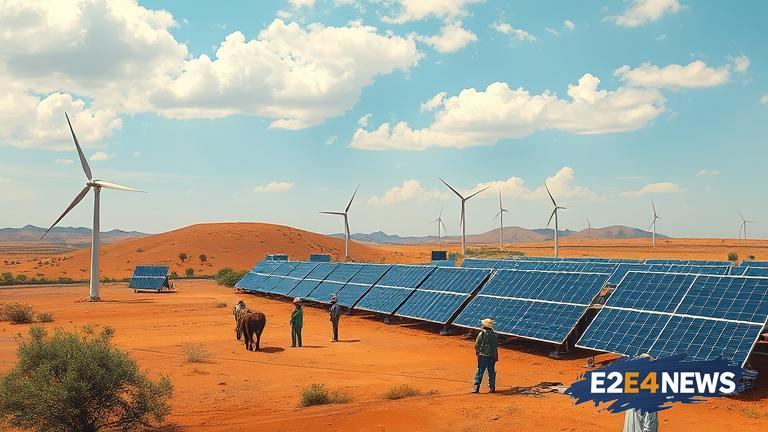The African continent is witnessing a significant shift towards renewable energy, driven by the need to address the pressing issues of energy access, climate change, and sustainable development. With a growing population and increasing economic activities, the demand for energy is on the rise, and renewable energy sources such as solar, wind, and hydroelectric power are becoming increasingly attractive. Many African countries are now investing heavily in renewable energy infrastructure, with a focus on solar and wind power. For instance, South Africa has set a target of generating 42% of its electricity from renewable sources by 2030, while Morocco aims to increase its renewable energy capacity to 52% by 2030. Egypt, on the other hand, has launched several large-scale renewable energy projects, including the Benban solar park, which is one of the largest solar parks in the world. The African Union has also launched the African Renewable Energy Initiative, which aims to achieve at least 300 GW of renewable energy capacity by 2030. The initiative has received significant support from international organizations and donors, including the African Development Bank, the European Union, and the United Nations. The growth of renewable energy in Africa is also driven by the declining cost of technology, making it more competitive with fossil fuels. Additionally, the use of renewable energy can help reduce greenhouse gas emissions and mitigate the impacts of climate change, which are particularly severe in Africa. The continent is also home to a large number of innovative renewable energy companies, which are developing new technologies and business models to increase access to energy. For example, companies such as M-Kopa Solar and Mobisol are providing pay-as-you-go solar home systems to off-grid households, while others such as Jumia and SolarNow are offering solar-powered products and services to businesses and individuals. The renewable energy sector is also creating new job opportunities and stimulating local economies, particularly in rural areas where energy access is limited. However, despite the progress made, there are still significant challenges to be addressed, including the lack of infrastructure, limited access to financing, and regulatory frameworks that are not always supportive of renewable energy development. To overcome these challenges, African countries will need to continue to invest in renewable energy infrastructure, develop supportive policies and regulations, and attract international investment and expertise. The private sector also has a critical role to play in driving the growth of renewable energy in Africa, through investments in new technologies and business models. International cooperation and partnerships will also be essential, particularly in the areas of technology transfer, capacity building, and financing. The African renewable energy revolution has the potential to transform the continent’s energy landscape, drive economic growth, and improve the lives of millions of people. With the right policies, investments, and partnerships, Africa can become a leader in the global transition to a low-carbon economy. The future of renewable energy in Africa looks bright, with many opportunities for growth, innovation, and development. As the continent continues to transition towards a more sustainable energy mix, it is likely that we will see significant reductions in greenhouse gas emissions, improvements in air quality, and enhanced energy security. The growth of renewable energy will also have positive impacts on public health, as air pollution from fossil fuels is a major cause of premature deaths and respiratory diseases. Furthermore, the renewable energy sector will continue to create new job opportunities, stimulate local economies, and contribute to poverty reduction. In conclusion, the African renewable energy revolution is gaining momentum, driven by a combination of factors, including government policies, declining technology costs, and international cooperation. As the continent continues to transition towards a more sustainable energy mix, it is likely that we will see significant economic, social, and environmental benefits, and a brighter future for generations to come.
